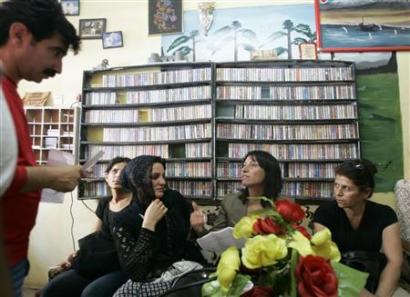
July 15, 2007 | By Paul de Bendern
DIYARBAKIR, Turkey (Reuters) - Pro-Kurdish politicians are poised to enter Turkey's parliament for the first time in more than a decade, bringing hope to many Kurds that their cultural and political rights will be addressed.
Turkey's poor, restive southeast has not been represented in parliament by pro-Kurdish parties since the early 1990s when several MPs were kicked out of the chamber and later jailed for speaking the Kurdish language while taking their oath of office.
Turkey's parliamentary elections are set for July 22.
"We don't care that they won't get into government. All we want is to be represented in parliament and that they speak on our behalf," said Mehmet Serif Kurtay, 47, a vegetable vendor in a dusty bazaar in Diyarbakir, the largest city of the southeast.
Turkey's Kurds, numbering between 12 million and 15 million in a total population of 74 million, have long complained of political, economic and cultural discrimination, partly because they are not officially recognised as an ethnic minority.
Kurds hope these elections will be a turning point for the poorest region in Turkey, a country otherwise experiencing an economic boom, and ultimately lead to the end to an armed conflict between separatist Kurdish rebels and the armed forces.
"No one dares to address the Kurdish issues because many Turks think all Kurds are terrorists and that the only language and identity in Turkey is Turkish," said Nusret Icli, a Kurdish musician who abandoned his professional music career after serving time in jail. He is now planning a new record.
Turkey's largest pro-Kurdish Democratic Society Party (DTP) has fielded dozens of unaffiliated or "independent" candidates because the DTP fears it would not pass Turkey's high 10 percent national threshold of votes required to win seats in parliament.
Opinion polls predict these candidates will win 20 to 30 of the 550 seats in parliament. That would be sufficient for the members to reorganise under the DTP banner once elected.
Turkey's ruling centre-right AK Party, with Islamist roots, is expected to remain the biggest party in the new parliament. The centre-left CHP and the far-right Turkish nationalist MHP are also tipped to clear the 10 percent barrier and win seats.
The DTP, then known as DEHAP, won six percent of the vote in the last general election in 2002. It picked up no seats despite winning most votes in the mainly Kurdish southeast.

"My worry is that expectations are too high, Kurds think all their problems will disappear once the DTP enters parliament. That would be true if Turkey were a democracy, but it's not," said Sezgin Tanrikulu, a leading human rights lawyer.
Turkish nationalists fear Kurds want to divide the country and say the DTP is a mouthpiece for the banned Kurdistan Workers Party (PKK), which still musters considerable regional support.
The DTP denies any links although people in the southeast say the party has loose ties with the rebel movement.
Ankara blames the PKK -- considered a terrorist organisation by the United States and the European Union as well as by Turkey -- for more than 30,000 deaths since the group launched its armed campaign for an independent homeland in 1984.
Violence is again on the rise, with over 200 soldiers and PKK rebels killed since January, a human rights group says.
Many locals believe the DTP can help end the conflict.
But if opinion polls are correct, the DTP could find itself embroiled in confrontations and possibly legal challenges from Turkish nationalists once in parliament.
Aysel Tugluk, a DTP member running as an independent, is likely to get heat from fellow MPs if elected because of her ties as a defence lawyer for jailed PKK leader Abdullah Ocalan.
DTP leader Ahmet Turk, a veteran politician who was among those jailed over the 1991 incident in parliament, downplayed concerns that his party would spoil this historic opportunity.
"We know there will be provocations, but we are not going to parliament to create clashes, but to find solutions," said Turk during a campaign trip to Kiziltepe, near the Syrian border.
The DTP already runs a few municipalities in the southeast.
Pressured by the EU, Turkey's AK Party government has taken small steps to meet Kurdish demands in recent years, such as allowing limited Kurdish language television broadcasts and private Kurdish language classes.
"The situation has improved since we came to power, but it takes time and there is a lot of history to overcome," said Agriculture Minister Mehdi Eker, himself a Kurd, during a campaign trip to the province of Igdir in eastern Turkey.
Some local people seem impressed by the AK Party's record.
"I'm voting for the AK Party because they are making investments and giving us school books. I don't know what the DTP has done," said student Aydin Baykara, 21, from Kiziltepe.


